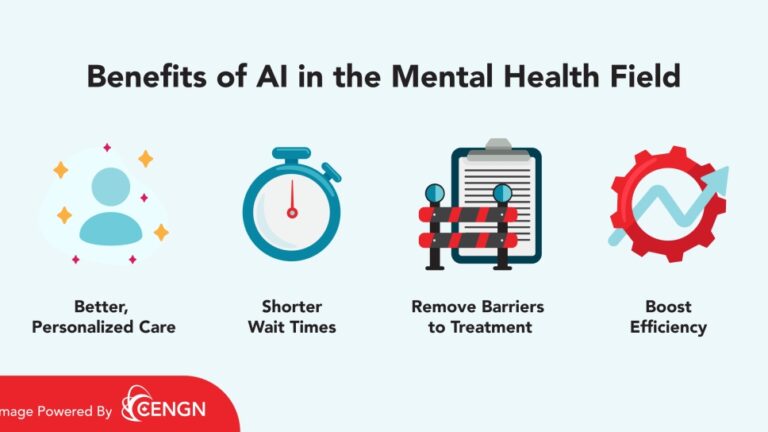In the era of technological advancement, artificial intelligence (AI) is making waves across various industries, with healthcare being one of the most prominent. Among the many applications of AI in healthcare, one area that stands out is mental health. This article aims to explore the transformative potential of AI in early detection and support of mental health, highlighting how advanced technology can potentially improve outcomes for people experiencing mental health issues .
The role of AI in mental health assessment
In a study led by Max Rollwage Ph.D., a form of AI known as limbic access was used in the United Kingdom for mental health treatment. Integrated into the referral and assessment process, AI has helped reduce wait times, dropout rates, and allocation of treatment for incorrect diagnoses. The study focused on data from nine NHS Talking Therapies services across England, involving 64,862 patients. The results showed the potential of AI to improve patient outcomes and ease the burden on clinicians, providing much-needed relief to the overburdened mental health sector.
AI-based chatbots for mental health promotion
A systematic review and meta-analysis of AI-based conversational agents (CAs) to promote mental health was conducted. Results revealed that these agents significantly reduced symptoms of depression and distress, particularly when integrated with mobile instant messaging applications and targeted subclinical and elderly clinical populations. However, the intervention showed no significant improvement in overall psychological well-being. The user experience with AI-based CAs has been largely shaped by the quality of human-AI therapeutic relationships, content engagement, and communication effectiveness. These findings highlight the potential of AI-based ACs to address mental health issues, but they also highlight the need for more research into the underlying mechanisms of their effectiveness and safe integration into healthcare. mental.
AI in early detection and mental health support
AI holds immense potential in early detection and support for mental health issues. It can analyze behavior patterns and language to identify mental health problems at an early stage. Various AI-powered tools and applications are available to provide support and resources to people struggling with mental health issues. For example, wearable devices like smartwatches and social media can be used to detect depression, with AI predicting the presence and severity of depression from the language of posts and community memberships with rates of success rate of up to 90%.
AI is revolutionizing the diagnosis and treatment of depression
AI is expected to revolutionize the diagnosis and treatment of depression. This can help make more accurate diagnoses and determine which treatments are most likely to work. AI can diagnose depression with more than 80% accuracy simply by examining brain structures on MRI scans. AI models based on MRI data can predict depression in more than 80% of cases, and the combination of functional and structural information from MRI can correctly predict depression in more than 93% of cases. AI has also shown promise in predicting responses to antidepressant treatment with over 70% accuracy from electronic health records alone.
The Transformative Role of AI in Behavioral Health
AI is playing a transformative role in behavioral health, providing early detection, therapy and mental health support. It plays a critical role in providing value-based care, meeting the needs of underserved communities and strengthening partnerships between health plans and behavioral health providers. The future of AI in mental health care involves embracing AI integration, prioritizing collaboration, investing in AI education, and advocating for accessibility.
In conclusion, integrating AI into mental health care could significantly improve the early detection and treatment of mental health problems. Although there is an undeniable need for further research and careful integration, the promising results obtained so far point to a bright future for AI in this area.
